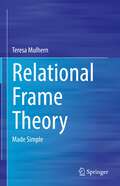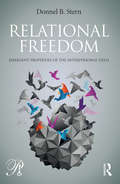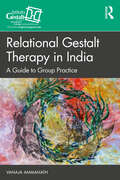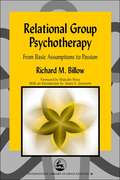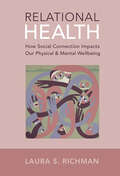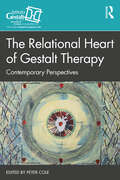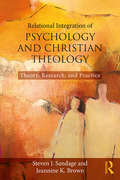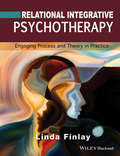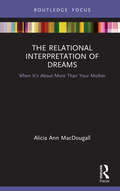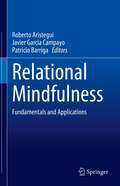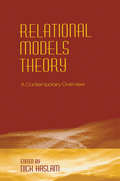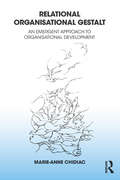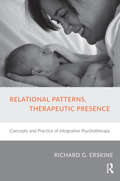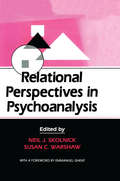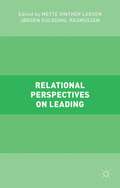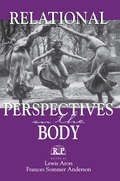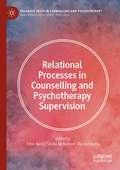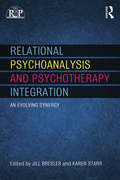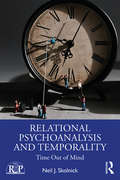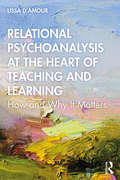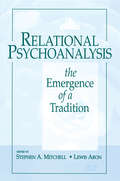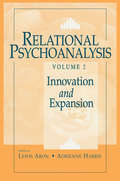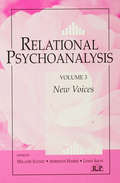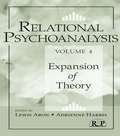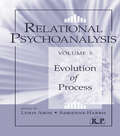- Table View
- List View
Relational Frame Theory: Made Simple
by Teresa MulhernRelational Frame Theory: What is it? Why is it important? How can I use it? This book dispels the confusion surrounding Relational Frame Theory and provides an easy-to-understand briefing of Relational Frame Theory and its’ components, with examples to enhance and ease understanding. Recent research has indicated that Relational Frame Theory may form the cornerstone of language and intelligence and this textbook integrates this information into an easily digestible format, considering the importance of each relational frame from coordination to analogy. Relational Frame Theory provides a potentially useful framework for teaching language and academic skills and the current textbook provides some examples of how to do this and offers some considerations for future research in this area. This book makes Relational Frame Theory easy to understand and, unlike previous books, assumes no prior knowledge of the theory amongst readers and clarifies some of the jargon used within this body of work. This book provides the most up-to-date outline of previous work within Relational Frame Theory and gives an overview of how this theory could be applied within psychology. To date, no previous book has attempted to integrate research, application and an easy-to-understand overview of the theory together – this book aims to integrate all of these aspects into one easily comprehensible guide. The current textbook is aimed towards graduate students and practitioners of applied behavior analysis. Given the proposed changes to the Behavior Analysis Certification Board which will focus more on Relational Frame Theory than in the past, a book of this nature will be helpful for those pursuing certification and may also be helpful for use within the applied field.
Relational Freedom: Emergent Properties of the Interpersonal Field (Psychoanalysis in a New Key Book Series)
by Donnel B. SternRelational Freedom: Emergent Properties of the Interpersonal Field addresses the interpersonal field in clinical psychoanalysis and psychotherapy, especially the emergent qualities of the field. The book builds on the foundation of unformulated experience, dissociation, and enactment defined and explored in Stern’s previous, widely read books. Stern never considers the analyst or the patient alone; all clinical events take place between them and involve them both. Their conscious and unconscious conduct and experience are the field’s substance. We can say that the changing nature of the field determines the experience that patient and analyst can create in one another’s presence; but we can also say that the therapeutic dyad, simply by doing their work together, ceaselessly configures and reconfigures the field. "Relational freedom" is Stern’s own interpersonal and relational conception of the field, which he compares, along with other varieties of interpersonal/relational field theory, to the work of Bionian field theorists such as Madeleine and Willy Baranger, and Antonino Ferro. Other chapters concern the role of the field in accessing the frozen experience of trauma, in creating theories of therapeutic technique, evaluating quantitative psychotherapy research, evaluating the utility of the concept of unconscious phantasy, treating the hard-to-engage patient, and in devising the ideal psychoanalytic institute. Relational Freedom is a clear, authoritative, and impassioned statement of the current state of interpersonal and relational psychoanalytic theory and clinical thinking. It will interest anyone who wants to stay up to date with current developments in American psychoanalysis, and for those newer to the field it will serve as an introduction to many of the important questions in contemporary psychoanalysis. Psychoanalysts and psychotherapists of all kinds will profit from the book’s thoughtful discussions of clinical problems and quandaries. Donnel B. Stern, Ph.D.., a psychoanalyst and psychotherapist in private practice in New York City, serves as Training and Supervising Analyst at the William Alanson White Institute, and Adjunct Clinical Professor and Consultant at the NYU Postodoctoral Program in Psychotherapy and Psychoanalysis. He is the founder and editor of "Psychoanalysis in a New Key," a book series published by Routledge.
Relational Gestalt Therapy in India: A Guide to Group Practice (Gestalt Therapy Book Series)
by Vanaja AmmanathThis fascinating book examines the place and practice of Relational Gestalt therapy (RGT) within an Indian cultural context, and how it can be applied in a group setting. The book begins by introducing the foundational concepts of Gestalt therapy (GT), namely phenomenology, field theory and dialogic existentialism. Through stories and vignettes, it then invites the reader to enter the circle of the group, a profound way of learning akin to the old Indian folk tradition of village communities sharing stories and bonding as a social group. Drawing from these narratives, the book not only elaborates on the theoretical concepts of GT, but also offers culturally sensitive guidance for Indian practitioners wishing to conduct group therapy. Written by a practitioner with over 20 years’ experience, this book will prove essential reading not only for practitioners working in India, but also for anyone with an interest in how GT can be applied in group settings in different cultural contexts.
Relational Group Psychotherapy: From Basic Assumptions to Passion
by Malcolm Pines Richard BillowIntegrating cutting-edge relational theory with technique, this volume reveals the deeply personal nature of the intersubjective process of group therapy as it affects the group therapist and other group members. By locating the group therapist's experience in the centre of the action, Richard M. Billow moves away from traditional approaches in group psychotherapy. Instead, he places emphasis on the effect of the therapist's own evolving psychology on what occurs and what does not occur in group psychotherapy. Building on Bion's early theory of group and his later formulations regarding the structure of thought and the role of affect, this work expands on the present understanding of relational theory and technique. Through the use of clinical anecdotes the author is able to ground theory in the realities of clinical experience making this essential reading for group psychoanalysts and psychotherapists, psychiatrists and other mental health professionals, academics and students of psychoanalytic theory.
Relational Health: How Social Connection Impacts Our Physical and Mental Wellbeing
by Laura S. RichmanWe tend to credit the healthy for good habits and discipline, and assign blame to the sick. All too often we view our health as a product of individual inputs rather than through a lens of interconnected, relational health. The relational health perspective offers an alternative way to view how our health is shaped and what the most productive avenues are for achieving long-term positive outcomes. This book draws on empirical research that illuminates how social relationships affect health outcomes, with a focus on three specific health problems: obesity, opioid use disorder, and depression in older adults. It incorporates examples of the untapped potential of community resources, social networks, and varied partnerships. The research presented is supplemented by perspectives from healthcare providers, patients and their families, and health policy experts, examining the role of relationships in health production and maintenance.
The Relational Heart of Gestalt Therapy: Contemporary Perspectives (Gestalt Therapy Book Series)
by Peter ColeThis compelling and comprehensive volume is an anthology of current thinking by many of gestalt therapy’s leading theoreticians, clinicians, and researchers. Including many well-known voices in the field and introducing several new ones to the current gestalt therapy literature, the book presents a broad-ranging compendium of essays, scientific articles, clinical applications, and integrative approaches that represent the richness and vibrancy of the field. Each contributor brings intellectual rigor, honest personal reflection, and humanism to their area of inquiry. This ethos—the spirit of relational gestalt therapy—infuses the whole book, bringing a sense of coherence to its seventeen chapters. Following an introduction written by Mark Winitsky, PhD, as an entry point into the field for students and psychotherapists from other schools of thought, the book is organized into three sections: Theory, Clinical Applications, and Integrative Approaches. Readers will encounter new ways of thinking about psychotherapy, new skills they can bring to their work, and new ways of integrating gestalt therapy with other approaches. The Relational Heart of Gestalt Therapy is essential reading for Gestalt therapists as well as other mental health professionals with an interest in Gestalt approaches.
Relational Integration of Psychology and Christian Theology: Theory, Research, and Practice
by Jeannine K. Brown Steven J. SandageRelational Integration of Psychology and Christian Theology offers an in-depth, interdisciplinary relational framework that integrates theology, psychology, and clinical and other applications. Building on existing models and debates about the relationship between psychology and theology, the authors provide a much-needed examination of the actual interpersonal dynamics of integration and its implications for training and clinical practice. Case studies from a variety of clinical and educational contexts illustrate and support the authors’ model of relational integration. Using an approach that is sensitive to theological diversity and to social context, this book puts forward a theological and therapeutic framework that values diversity, the repairing of ruptures, and collaboration.
Relational Integrative Psychotherapy
by Linda FinlayDesigned specifically for the needs of trainees and newly-qualified therapists, Relational Integrative Psychotherapy outlines a form of therapy that prioritizes the client and allows for diverse techniques to be integrated within a strong therapeutic relationship. Provides an evidence-based introduction to the processes and theory of relational integrative psychotherapy in practice Presents innovative ideas that draw from a variety of traditions, including cognitive, existential-phenomenological, gestalt, psychoanalytic, systems theory, and transactional analysis Includes case studies, footnotes, 'theory into practice' boxes, and discussion of competing and complementary theoretical frameworks Written by an internationally acclaimed speaker and author who is also an active practitioner of relational integrative psychotherapy
The Relational Interpretation of Dreams: When it’s About More Than Your Mother
by Alicia Ann MacDougallThis book explains the use of dreams as a tool in psychotherapy to provide meaning, establish and maintain a therapeutic relationship, and thus enhance and progress treatment. Maintaining a focus on the synergy between dreams and relationship, it includes interviews with four eminent dream researchers and scholars: John S. Antrobus, G. William Domhoff, Mark J. Blechner, and J. Allan Hobson. This book explores the synergistic qualities between dreams and relationships, and how that synergy generates biographically, professionally, and psychotherapeutically formative experiences. The book delineates the ways in which dreams provide a foundation for relating, provides a container (Bion, 1967/1993) for the unthought known (Bollas, 1987), creates meaning through relationships, and ultimately fosters dispersion of relational dynamics originating from the culture of the times and more. From a relational psychoanalytic perspective, this book describes the role of dreams in shaping our relational living. This book provides a unique perspective that illustrates using yourself as a tool in relational establishment, preservation, and knowing. It is ideal for students working toward an understanding of the influence of intersubjective space in clinical interactions and clinicians looking for additional and alternate ways to connect with patients.
Relational Mindfulness: Fundamentals and Applications
by Roberto Aristegui Javier Garcia Campayo Patricio BarrigaThis book proposes a new approach to mindfulness-based interventions, presenting them not as individual, but as relational practices. In the last decades, mindfulness has exerted a growing influence on many fields of research and activity, but always as an individual practice. The authors in this volume believe that the strong development of mindfulness today implies considering a dialogue between this individualistic approach and the perspective of relational mindfulness based on social constructionism. The volume is organized in two parts. The first part focuses on the theoretical foundations of relational mindfulness. The second part presents possibilities of applications of relational mindfulness in clinical and organizational settings to promote mental health and personal development.Relational Mindfulness: Fundamentals and Applications will be of interest to a wide range of professionals interested in applying mindfulness-based interventions in mental health care and productive organizations, such as clinical and health psychologists, public health professionals and human resources analysts and consultants, among others. "It is true that the metaphor of mindfulness has been enormously fruitful in its invitation to innovate. By removing meditative practices from their ancient roots, practitioners were free to create practices especially relevant to context. (…) At the same time, there was also a recognizable loss in the profoundly rich heritage that was left behind. For many of us, the greatest loss resulted from the absorption of such practices into Western individualism. What had once been an orientation to practice emphasizing our fundamental inter-being, had become a gateway to silent separation. It is in this context that the present volume bursts into significance. With special appreciation to the editors of this book, we are treated to a multi-dimensional exploration into the relational dimensions of mindfulness practices. Bringing ideas, experience, and wisdom from across professions, and across continents the contributors open an exciting path to the future." - Excerpt from the Foreword by Kenneth J. Gergen
Relational Models Theory: A Contemporary Overview
by Nick HaslamRelational models theory, first developed by Alan Page Fiske, an anthropologist, provides a framework for understanding the psychological bases of social behavior that has in recent years attracted the interest of a diverse and growing group of behavioral and social scientists. It proposes that human activities are structured in accordance with four fundamental models--communal sharing, authority ranking, equality matching, and market pricing--different permutations of which guide thought and behavior in every domain of social life in all cultures. Just as children are biologically programmed to learn language, so are they prepared to recognize the models, which enable human beings to plan and generate their own action; to understand, remember, and anticipate that of others; to coordinate collective action and institutions; and to make moral judgments.This book offers a critical introduction to contemporary relational models theory and illustrates the ways in which it has illuminated a wide range of interpersonal phenomena and stimulated research on individual psychology, collective behavior, and culture. Using methodologies that range from experimental to ethnographic, the authors--leading developmental, social and clinical psychologists, anthropologists, and specialists in organizational behavior and management--discuss the relational foundations of social cognition, the forms of action that create relationships in diverse cultures, perceptions of fairness and justice in families and organizations, emotions and values, moral outrage, interpersonal conflict, and emotional and personality disorders.Relational Models Theory lays out challenges to all who study interpersonal relationships and social processes in varying contexts, and points directions for future work.
Relational Organisational Gestalt: An Emergent Approach to Organisational Development
by Marie-Anne ChidiacThis book provides a comprehensive view of the application of Relational Gestalt theory to Organisation Development and change interventions in organisations. Uncertainty and frequent change are the hallmark of our times. In the field of Organisational Development and Change, fixed methodologies no longer adequately address the uncertainty and uniqueness of today's more complex change situations and more adaptive approaches to change are needed. Gestalt is a relational, dialogic, and emergent approach which means that it views individuals and organisations as embedded in their context, dependent on, and emerging from within a web of relationships and interactions. As such, Gestalt offers a transformative, integral and bespoke methodology for working with this complexity. This approach supports practitioners to attend to their presence, seek out the most pressing issues and mobilise for sustainable change. Gestalt has at its heart the notion of use-of-self as instrument which allows practitioners to be responsive to emergent issues and situations. Relational Organisational Gestalt is at the leading-edge of Gestalt theory and application in organisational settings.
Relational Patterns, Therapeutic Presence: Concepts and Practice of Integrative Psychotherapy
by Richard G. ErskineThe introduction and the twenty-one chapters in this book reflect the ongoing development and refinement of Relational and Integrative Psychotherapy. Each chapter amalgamates ideas from several theoretical frame works: Client-Centred Therapy, Gestalt Therapy, Transactional Analysis, Contemporary Psychoanalysis, and Psychoanalytic Self-Psychology, as well as inter-subjective and co-creative perspectives.The theory of 'Life Script' serves as a unifying theme to elaborate the concepts of unconscious experience, attachment and relational patterns, the essentialness of contact-in-relationship, and the centrality of relational-needs in the practice of psychotherapy. This book begins with eight philosophical assumptions essential in the practice of a relational psychotherapy. Integrated throughout the chapters is a sensitivity to both normal developmental processes and the psychological compensations that occur when there has been prolonged neglect and psychological trauma. Several case presentations illustrate the use of phenomenological and historical inquiry, developmental and rhythmic attunement, and the importance of therapeutic presence.
Relational Perspectives in Psychoanalysis
by Neil J. Skolnick Susan C. WarshawA watershed in the articulation of the relational psychoanalytic paradigm, this volume offers a rich overview of issues currently being addressed by clinicians and theoreticians writing from a variety of complementary relational viewpoints. Chapter topics cover the roots of the relational orientation in early psychoanalytic thinking, the impact of relational consideration on developmental theory, relational conceptions of "self" and "other," and clinical applications of relational perspectives.
Relational Perspectives on Leading
by Mette Vinther Larsen Jørgen Gulddahl RasmussenRelational Perspectives on Leading discusses leadership from a relational and social constructionism perspective as practiced on an everyday basis between people. The book pursues a fast growing, practice-based approach - particularly within the Anglo-Saxon parts of the world - to organization studies and organizational phenomena. This approach allows more micro-oriented and incremental aspects of organizational practices to be explored. Key concepts explored within this perspective revolve around plurality, emergence, interpretation, communication, meaning, linguistic turn, practice, coincidence, in-situ, co-construction and the ability to construct new ways to move forward in relation with other. The authors analyse these concepts by integrating theory and practice in concrete organizational examples.
Relational Perspectives on the Body (Relational Perspectives Book Series #Vol. 12)
by Lewis Aron Frances Sommer AndersonContemporary psychoanalysis has devoted so much of its attention to relational and interpersonal aspects of psychic life that questions have begun to emerge regarding the place of the body and bodily experience in our psychological worlds. Relational Perspectives on the Body addresses these questions in exemplary fashion. Contemporary relational theorists synthesize a variety of theoretical trends and influences - including feminism and postmodernism - in order to provide innovative relational models of psyche-soma integration. Throughout the book, contributors pay attention to the analysand's and the analyst's experiences as they devise original technical responses to the multifaceted ways in which bodily experiences enter into the relational matrix of psychoanalytic treatment. In the process, contributors take up subjects that are seldom addressed in the clinical literature, including breast cancer in the analyst, psychoanalytic treatment of Munchausen's Syndrome, physical deformity, and musculoskeletal back pain. The final three chapters, by Looker, Balamuth, and Anderson, respectively, grew out of a study group that continues to investigate the relationship between somatic and symbolized experience. The editors are well equipped to undertake this project. Lewis Aron is a leading relational theorist and clinical analyst, and Frances Sommer Anderson has employed a psychoanalytically informed approach to treating musculoskeletal back pain and other somatic symptoms for 18 years. The editors have enlisted original contributions from an excellent group of colleagues, placing Relational Perspectives on the Body at the forefront of the revival of interest in the body and bodily experience in psychoanalytic theory and practice.
Relational Processes in Counselling and Psychotherapy Supervision (Palgrave Texts in Counselling and Psychotherapy)
by Ottar Ness Sheila McNamee Øyvind KvelloThis book is focused on relational processes in supervision for counselling and psychotherapy. The aim is first to introduce a relational theoretical stance, then to apply that stance to the process of supervision, and finally to offer practitioners immediately accessible resources for relational supervision. Within a relational perspective, supervisor and supervisees are viewed as partners who co-construct the supervisory process. Unlike other approaches to supervision where the emphasis is on specific techniques and strategies for supervision, the relational orientation of this book invites supervisor and supervisee into different understandings of the supervisory interaction. This orientation directs our attention to the importance of co-creating the therapeutic relation/alliance with special attention to the wellbeing of the the supervisee and the supervisor. Supervision, from this perspective, is focused on what participants are making together rather than on the individual abilities, strengths, and weaknesses of either the supervisor or the supervisee.
Relational Psychoanalysis and Psychotherapy Integration: An evolving synergy (Relational Perspectives Book Series)
by Jill Bresler Karen E. StarrRelational Psychoanalysis and Psychotherapy Integration traces the history of efforts to integrate psychoanalysis with other psychotherapeutic modalities, beginning with the early analysts, including Ferenczi and Rank, and continuing on to the present day. It explores the potential for integration made possible by contemporary developments in theory and technique that are fundamental to a relational psychoanalytic approach. Editors Jill Bresler and Karen Starr bring together an array of valuable theoretical and clinical contributions by relationally oriented psychoanalysts who identify their work as integrative. The book is organized in four segments: theoretical frameworks of psychotherapy integration; integrating multiple models of psychotherapy into a psychoanalytically informed treatment; working with specific populations; the future of integration, exploring the issues involved in educating clinicians in integrative practice. The contributions in this volume demonstrate that integrating techniques from a variety of psychotherapies outside of psychoanalysis can enrich and enhance psychoanalytic practice. It will be an invaluable resource for all practicing psychoanalysts, psychotherapists, and psychoanalysts and psychotherapists in training, particularly those with an interest in relational psychoanalysis and psychotherapy integration.
Relational Psychoanalysis and Temporality: Time Out of Mind (Relational Perspectives Book Series)
by Neil J. SkolnickIn Relational Psychoanalysis and Temporality, Neil J. Skolnick takes us on a journey that traces his personal evolution from a graduate student through to his career as a relational psychoanalyst. Skolnick uniquely shares his publications and presentations that span his professional career, weaving in issues around temporality and relational psychoanalysis. Accessible and deeply thought-provoking, this book explores the many ways our lives are pervaded and shaped by time, and how it infuses the problems that psychoanalysts work with in the consulting room. Skolnick begins each chapter with an introduction, contextualizing the papers in his own evolution as a relational analyst as well as in the broader evolution of the relational conceit in the psychoanalytic field. Following an incisive description of the realities and mysteries of time, he highlights how psychoanalysts have applied several temporal phenomena to the psychoanalytic process. The papers and presentations address an assortment of time-worn psychoanalytic issues as they have become redefined, reconfigured and re-contextualized by the application of a relational psychoanalytic perspective. It purports to chart the changes in the field and the author’s practice as, like many psychoanalysts, Skolnick explains his shifted perspective from classical to ego psychological, to relational psychoanalysis across the trajectory of his career. Finally, the author struggles to understand the contributions of time to the process of change in psychoanalytic thought and practice. This book also provides a fascinating guide to how our lives are contextualized in the invisibilities of time, illuminating the most frequent ways time influences psychoanalytic thinking and practice. Relational Psychoanalysis and Temporality will be of immense interest to psychoanalysts, psychoanalytic psychotherapists and therapists of all persuasions in their practice and training. It should also be of interest to philosophers, historians and scholars of psychoanalysis who have a general interest in studying the role of psychoanalysis in influencing contemporary trends of Western thought.
Relational Psychoanalysis at the Heart of Teaching and Learning: How and Why it Matters
by Lissa D’AmourThis book introduces the insights of contemporary relational psychoanalysis to educational thought and uses them as the foundation for a comprehensive model for understanding and informing teaching and learning practice. The model integrates what we know about conscious thought, motivation, and the physical body and translates these understandings in ways that are meaningful and relevant to the circumstances of practicing teachers, school leaders, and teachers of teachers. It will be of great interest to them and to those educational scholars whose attentions turn to the exigencies of the current era. Echoing calls for inclusivity, the book stands against admonishing anyone on the right way to be a person. Instead it emphasises understanding and, in understanding, practicing well. Readers will gain a deeper appreciation of the nature of sense-making and awareness and of the practical implications of cognition as embodied, life forms as non-linear dynamic systems, and relationships as core to human development and classroom life. It was Einstein who, in a letter to Freud, once asked for an educational solution to the menace of war. Today’s urgencies – of nations divided, diminishing planetary resources, and certain ecological disasters – press for wisdom beyond our collective habit. Thankfully the once-elusive mysteries of life, mind, learning, and learning systems now yield in ways to help shape answers to Einstein’s question. Relational psychoanalysts, psychotherapists, educational theorists, teachers, and those who work with them will be intrigued by the convergences and heartened at the possibilities.
Relational Psychoanalysis, Volume 14: The Emergence of a Tradition (Relational Perspectives Book Series #14)
by Stephen A. Mitchell Lewis AronOver the course of the past 15 years, there has been a vast sea change in American psychoanalysis. It takes the form of a broad movement away from classical psychoanalytic theorizing grounded in Freud's drive theory toward models of mind and development grounded in object relations concepts. In clinical practice, there has been a corresponding movement away from the classical principles of neutrality, abstinence and anonymity toward an interactive vision of the analytic situation that places the analytic relationship, with its powerful, reciprocal affective currents, in the foreground. These developments have been evident in virtually all schools of psychoanalysis in America, from the most traditional to the most radical. The wellspring of these innovations is the work of a group of psychoanalysts who have struggled to integrate aspects of interpersonal psychoanalysis, various British object relations theories, and psychoanalytic feminism. Although not self-selected as a school, these theorists have generated a distinct tradition of psychoanalytic thought and clinical practice that has become extremely influential within psychoanalysis in the United States. Relational Psychoanalysis: The Emergence of a Tradition brings together for the first time the seminal papers of the major authors within this tradition. Each paper is accompanied by an introduction, in which the editors place it in its historical context, and a new afterward, in which the author suggests subsequent developments in his or her thinking. This book is an invaluable resource for any clinical practitioner, teacher or student of psychoanalysis interested in exploring the exciting developments of recent years.
Relational Psychoanalysis, Volume 2: Innovation and Expansion (Relational Perspectives Book Series)
by Lewis Aron Adrienne HarrisThe "relational turn" has transformed the field of psychoanalysis, with an impact that cuts across different schools of thought and clinical modalities. In the six years following publication of Volume 1, Relational Psychoanalysis: The Emergence of a Tradition, relational theorizing has continued to develop, expand, and challenge the parameters of clinical discourse. It has been a period of loss, with the passing of Stephen A. Mitchell and Emmanuel Ghent, but also a period of great promise, marked by the burgeoning publication of relational books and journals and the launching of relational training institutes and professional associations. Volume 2, Relational Psychoanalysis: Innovation and Expansion, brings together key papers of the recent past that exemplify the continuing growth and refinement of the relational sensibility. In selecting these papers, Editors Lewis Aron and Adrienne Harris have stressed the shared relational dimension of different psychoanalytic traditions, and they have used such commonalities to structure the best recent contributions to the literature. The topics covered in Volume 2 reflect both the evolution of psychoanalysis and the unique pathways that leading relational writers have been pursuing and in some cases establishing.
Relational Psychoanalysis, Volume 3: New Voices (Relational Perspectives Book Series #34)
by Melanie Suchet Adrienne Harris Lewis AronRelational psychoanalysis has revivified psychoanalytic discourse by attesting to the analyst's multidimensional subjectivity and then showing how this subjectivity opens to deeper insights about the experience of analysis. Volume 3 of the Relational Psychoanalysis Book Series enlarges this ongoing project in significant ways. Here, leading relational theorists explore the cultural, racial, class-conscious, gendered, and even traumatized anlagen of the self as pathways to clinical understanding. Relational Psychoanalysis: New Voices is especially a forum for new relational voices and new idioms of relational discourse. Established writers, Muriel Dimen, Sue Grand, and Ruth Stein among them, utilize aspects of their own subjectivity to illuminate heretofore neglected dimensions of cultural experience, of trauma, and of clinical stalemate. A host of new voices applies relational thinking to aspects of race, class, and politics as they emerge in the clinical situation. The contributors to Relational Psychoanalysis: New Voices are boldly unconventional – in their topics, in their modes of discourse, and in their innovative and often courageous uses of self. Collectively, they convey the ever widening scope of the relational sensibility. The "relational turn" keeps turning.
Relational Psychoanalysis, Volume 4: Expansion of Theory (Relational Perspectives Book Series #14)
by Adrienne Harris Lewis AronBuilding on the success and importance of three previous volumes, Relational Psychoanalysis continues to expand and develop the relational turn. Under the keen editorship of Lewis Aron and Adrienne Harris, and comprised of the contributions of many of the leading voices in the relational world, Volume 4 carries on the legacy of this rich and diversified psychoanalytic approach by taking a fresh look at recent developments in relational theory. Included here are chapters on sexuality and gender, race and class, identity and self, thirdness, the transitional subject, the body, and more. Thoughtful, capacious, and integrative, this new volume places the leading edge of relational thought close at hand, and pushes the boundaries of the relational turn that much closer to the horizon. Contributors: Neil Altman, Jessica Benjamin, Emanuel Berman, Jeanne Wolff Bernstein, Susan Coates, Ken Corbett, Muriel Dimen, Martin Stephen Frommer, Jill Gentile, Samuel Gerson, Virginia Goldner, Sue Grand, Hazel Ipp, Kimberlyn Leary, Jonathan Slavin, Malcolm Owen Slavin, Charles Spezzano, Ruth Stein, Melanie Suchet.
Relational Psychoanalysis, Volume 5: Evolution of Process (Relational Perspectives Book Series #14)
by Lewis Aron Adrienne HarrisBuilding on the success and importance of three previous volumes, Relational Psychoanalysis continues to expand and develop the relational turn. Under the keen editorship of Lewis Aron and Adrienne Harris, and comprised of the contributions of many of the leading voices in the relational world, Volume 5 carries on the legacy of this rich and diversified psychoanalytic approach by taking a fresh look at the progress in therapeutic process. Included here are chapters on transference and countertransference, engagement, dissociation and self-states, analytic impasses, privacy and disclosure, enactments, improvisation, development, and more. Thoughtful, capacious, and integrative, this new volume places the leading edge of relational thought close at hand, and pushes the boundaries of the relational turn that much closer to the horizon. Contributors: Lewis Aron, Anthony Bass, Beatrice Beebe, Philip Bromberg, Steven Cooper, Jody Messler Davies, Darlene Ehrenberg, Dianne Elise, Glen Gabbard, Adrienne Harris, Irwin Hoffman, Steven Knoblauch, Thomas Ogden, Spyros Orfanos, Stuart Pizer, Philip Ringstrom, Jill Salberg, Stephen Seligman, Joyce Slochower, Donnel Stern, Paul Wachtel.
